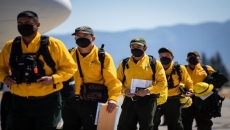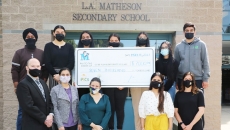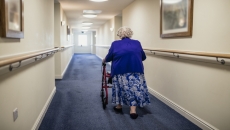OTTAWA - Conservatives say they disagree with a committee of federal representatives deciding who is allowed to enter the House of Commons based on their vaccination status against COVID-19.
The position presents the first challenge to the all-party board of internal economy ruling only people who are fully vaccinated will be allowed to enter the House of Commons precinct.
The Liberals, NDP and Bloc Québécois agree members of Parliament should be fully vaccinated to take their seat, and made it a rule for their candidates who ran in the recent federal election.
Conservative Leader Erin O'Toole did not, saying while he encourages vaccinations he respects people's individual health choices.
In a statement, Conservative whip Blake Richards says they believe that a negative result from a rapid COVID-19 test can assure that a workplace is safe.
Richards is one of two Tory MPs who sit on the eight-member committee that decided to make vaccinations a rule for the House and says he can't discuss what happened behind closed doors.
"While we encourage everyone who can be vaccinated to get vaccinated, we cannot agree to seven MPs, meeting in secret, deciding which of the 338 MPs, just elected by Canadians, can enter the House of Commons to represent their constituents," he said Wednesday.
O'Toole, who is vaccinated, has yet to say how many of his 118 elected members are fully immunized against COVID-19.
An analysis by The Canadian Press shows at least 79 say they are, with two MPs saying they cannot due to medical reasons and a third who reported being partially vaccinated with the intention to book a second shot.
Prime Minister Justin Trudeau will continue Wednesday consulting with opposition leaders about how the House of Commons should resume work and what the priorities should be once it is back in operation.
He is scheduled to have separate phone conversations with O'Toole, Singh and the parliamentary leader of the Greens, Elizabeth May.
On Tuesday, he exchanged ideas on the resumption of Parliament with Bloc Québécois Leader Yves-François Blanchet.
First on the agenda is whether the House of Commons should resume the hybrid sittings adopted to get through the COVID-19 pandemic or return to normal in-person operations.
That is likely to be a testy topic with O'Toole in the wake of the board's decision to admit only fully vaccinated individuals into the House precinct.
At the same time, the Conservatives have been the most adamant that the Commons should fully return to normal, with only in-person participation in the chamber or at committees.
However, O'Toole may yet be forced to accept hybrid sittings — allowing MPs to participate virtually from their homes or offices — as the only way to enable his unvaccinated MPs to take part in parliamentary proceedings.
A spokesman for government House leader Pablo Rodriguez said Tuesday the Liberals would prefer to continue hybrid sittings because they allow MPs more flexibility to adapt to changing circumstances of the pandemic across the country.
"We believe the hybrid House of Commons worked well earlier this year. We are supportive of continuing to have hybrid sittings of the House and continuing to make use of technology to ensure that Parliament continues to work well for all Canadians," said Simon Ross.
The NDP also favours hybrid sittings while the Bloc wants to resume normal in-person sittings.
The board of internal economy’s decision to require vaccination applies to all MPs, their staff, political research office staff, administration employees, journalists, business visitors, contracts and consultants.
The precinct includes not just the Commons chamber but some half dozen parliamentary buildings that house MPs' offices and Commons committee rooms.
Anyone with a medically valid reason for not getting vaccinated will have the option to show proof of a recent negative COVID-19 rapid antigen test result. Children under 12, who are not yet eligible for vaccinations, will also be exempt.
The Senate will make its own decision on whether proof of vaccination will be required for admittance to the upper house, its offices and committee rooms.






